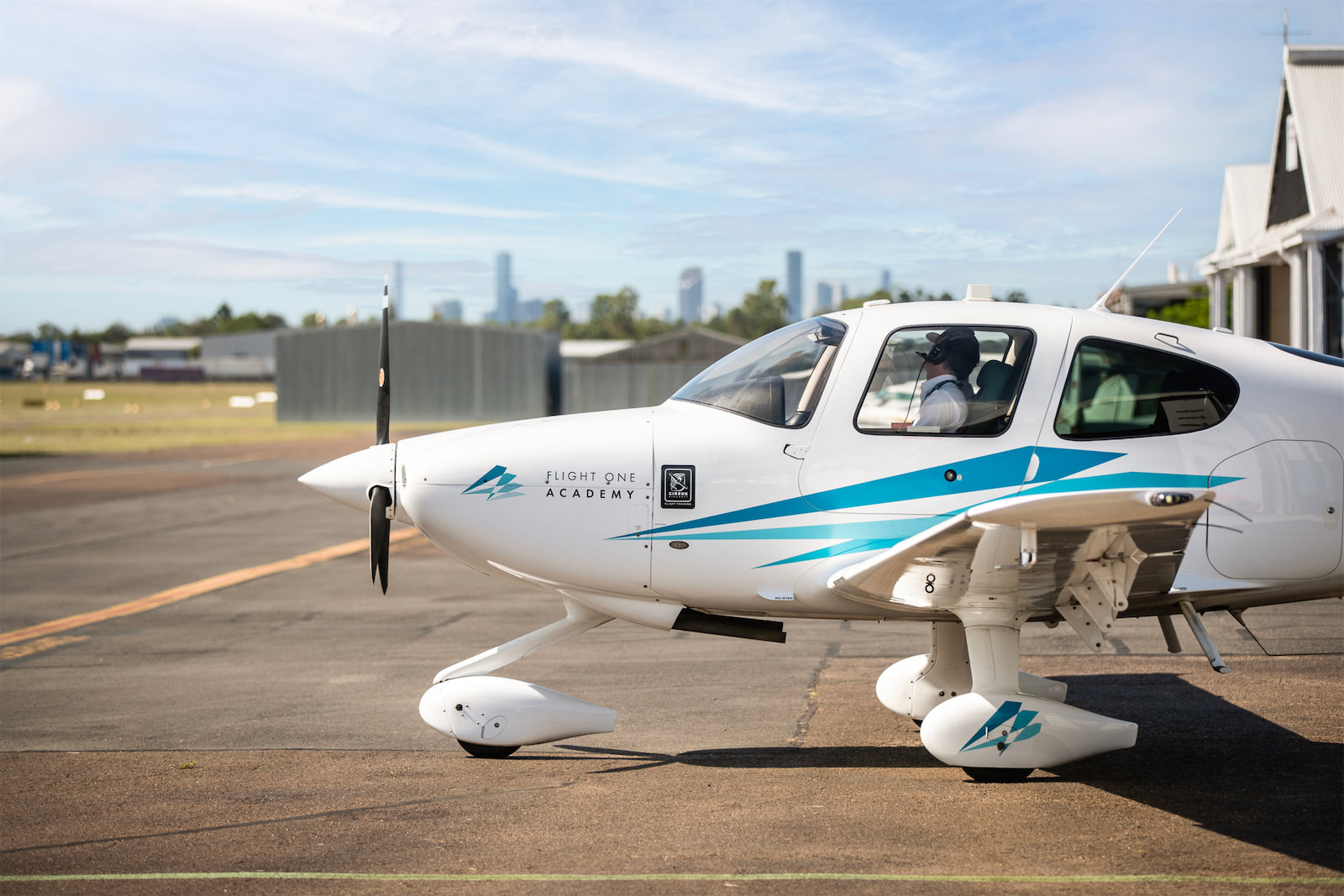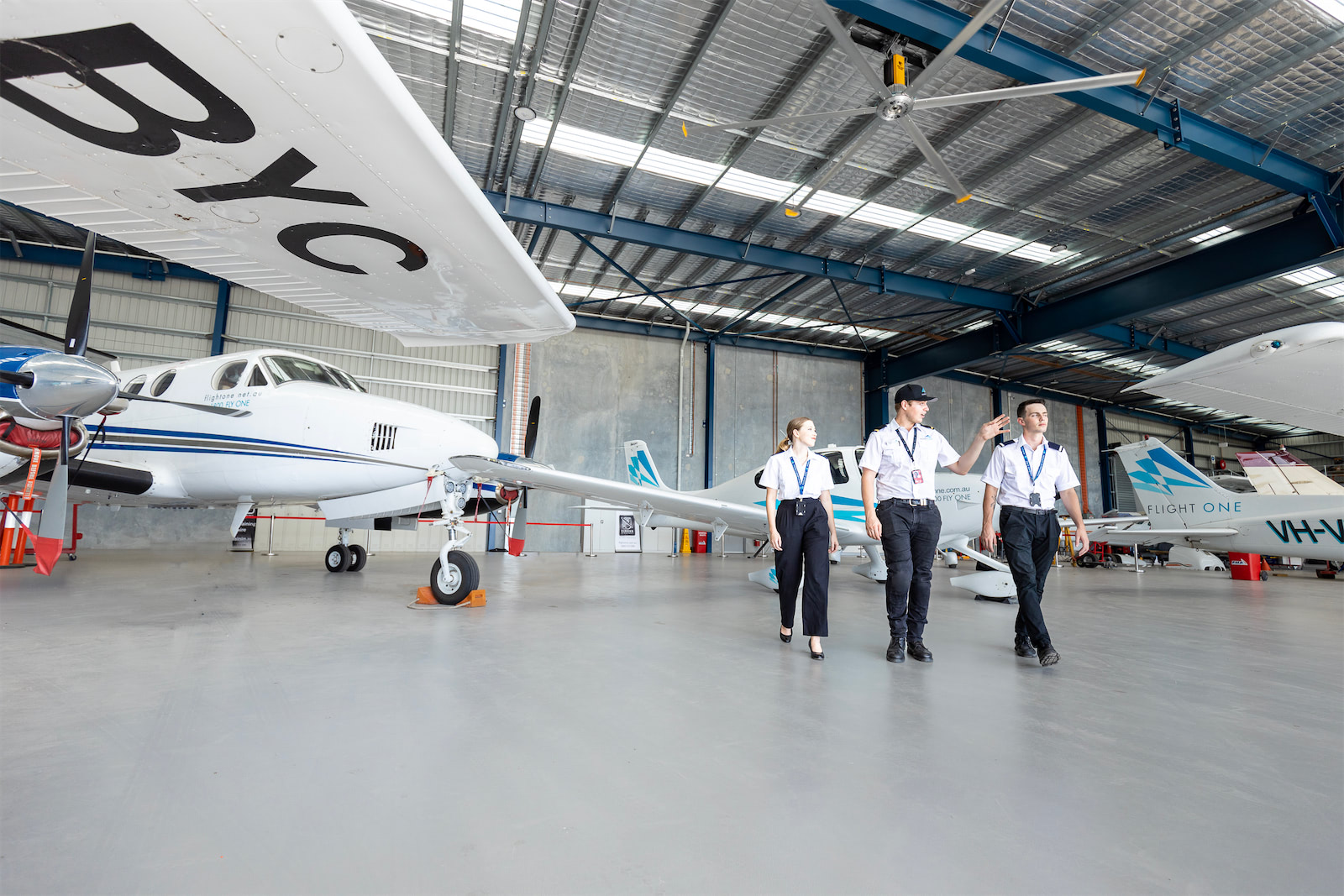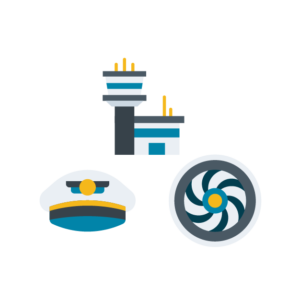Course Details
| Qualification |
AVI50219 Diploma of Aviation (CPL-Aeroplane) +
AVI50419 Diploma of Aviation (Instrument Rating) |
| Training Provider |
Flight One Academy (RTO 45165) |
| Training Location |
Archerfield Airport, Brisbane |
Introduction
Flight One Academy has the privilege of being both a CASA certified Flight Training Organisation and a Registered Training Organisation (RTO). These combined approvals allows us to deliver theory and practical training and assessments toward Australian pilot licences through formal Australian Qualifications Framework diplomas and offer VET Student Loans as a payment option.
Training is conducted at Archerfield Airport in Brisbane, Australia, by experienced aviation trainers utilising authentic training equipment and well maintained aircraft. As has been the case at Flight One for over a decade, Flight One Academy’s ethos revolves around diligent customer service – this is expressed in our boutique approach to scheduling lessons and working with each client as an individual facing the challenges of living in an increasingly expensive and time poor world.
As part of a broader aviation group that includes VIP and business chartering, airport FBO services and CASA approved aircraft maintenance and repair operations, we are able to offer a genuinely industry driven, innovative programmes with integrated theory and practical training to ensure that you are job ready upon graduation. Please visit About Us to learn more about our Academy and the broader Tisdall Aviation Group.
Our flagship double Diploma of Aviation will help you build the skills and experience to ignite a lifelong career in aviation, and progress you through to a dream role – whether your dream is in charter, freight, general aviation or flying with a domestic or international airline.
About Commercial Piloting
Commercial pilots carry out the safety critical activity of flight for reward in support of a wide range of clients. The vast array of activities undertaken include charter, aeromedical, passenger transport, photography and survey work.
Commercial pilots learn to utilise sophisticated electrical components of aircraft such as on board computers, radio and Global Navigation Satellite System (GPS) directional equipment.
The demand for qualified Pilots is an international trend, and the Commercial Pilot is well placed to pursue career paths in general aviation, regular passenger (airline) transport and specialised operational roles.
What is the Multi Engine Instrument Rating (MEIR) and why integrate it?
A Multi Engine endorsement provides you with the skills and necessary approval to fly aircraft with more than one engine, therefore carry a greater payload or number of passengers. This programme includes flight training in twin engine aircraft such as Beechcraft Seneca or the heavier Baron upon request. An Instrument Rating provides you with permission to undertake flights in a much broader range of conditions including at night and in poor weather. For this reason, holders of the Multi Engine Instrument Rating enjoy greater employability as they are more capable and have a greater range of aeronautical experience.
Outcomes
The Double Diploma of Aviation Package programme is designed around the concept of licence readiness – providing each graduate with the CASA theory and associated examinations required for a licence outcome. The programme is built for beginners and provides the ideal platform to launch a career as a professional pilot in the General Aviation or Airline sectors.
The course includes formal theory training aligned to the knowledge requirements within the Civil Aviation Safety Regulations, and assessments that are delivered under Flight One’s CASA Part 141 Flight Training Organisation Approval Certificate. When combined with our extensive practical training, this structure empowers our graduates and prepares them to seize career opportunities as they arise.
To be eligible to apply for a CASA Pilot Licence, graduates must also meet CASA’s stipulated requirements including exams and flight tests conducted by CASA appointed testing officers. The expected CASA licence, rating and endorsement outcomes of this course, subject to demonstrated competencies, are:
- Recreational Pilot Licence (RPL)
- Private Pilot Licence (PPL)
- Commercial Pilot Licence (CPL)
- Instrument Rating (IR)
- Multi-Engine Class Rating (MEA)
Exposure to Navigation Aids may include:
- Non-Directional Beacon (NDB)
- VHF Omni Directional Radio Range (VOR)
- Instrument Landing System (ILS) / Localiser (LLZ)
- Distance Measuring Equipment (DME) or GPS Arrival (DGA)
- Global Navigation Satellite Systems (GNSS)
The expected Nationally Recognised Training (NRT) formal qualification outcomes, subject to demonstrated competencies, are:
- AVI50219 Diploma of Aviation (CPL-Aeroplane)
- AVI50419 Diploma of Aviation (Instrument Rating)
Training & Assessment Arrangements
Training is conducted at Archerfield Airport in Brisbane, Australia, via face to face classroom learning by experienced flight instructors utilising an extensive training fleet and simulators.
Assessments for this programme are conducted and invigilated in accordance with the requirements of the Civil Aviation Safety Authority (CASA) and the Australian Skills Quality Authority (ASQA). Assessments may include, but are not limited to, multiple choice, short answer, short essays, group work under observation and practical aviation assessments.
Recognition For Prior Learning (RPL)
Applicants with well documented previous training and/or experience may be eligible for Recognition for Prior Learning toward Units of Competency included in this qualification. Please advise at the time of application if you are seeking RPL.
Delivery Mode
The course is delivered face to face on campus, supported by online learning facilities. Our bespoke, customer-first training methodology allows trainees to liaise directly with their instructors to establish lesson timing around commitments, and undertake self-guided learning and individual or small group briefings to achieve theory competencies, rather than being required to join scheduled classroom activities. It is important to note that whilst our instructors provide flexibility, there are constraints caused by aircraft and instructor availability and the requirements of the VET Student Loans system. A suitable rate of progress, participation and professionalism must be maintained at all times.
Students undertaking this course are expected to wear the uniform provided.
RPL1
| WEEKS |
DUAL FLIGHTS |
SOLO FLIGHTS |
SIMULATOR |
AIRCRAFT |
 |
 |
 |
 |
 |
11
|
10.4
|
0.2
|
0.0
|
C172
|
The RPL1 phase introduces the concepts and principles of aircraft flight and contains the initial fundamentals of piloting a single engine aeroplane. Training is conducted in a Cessna 172S – one of the world’s most famous, safe and reliable training and private passenger aircraft, this phase concludes with the first solo flight.
Practical training and assessment in this phase include:
- Taking off
- Climbing
- Flying straight and level
- Turning
- Descending
- Circuits
- Landing
Theoretical training and assessment in this phase include:
ASQA Formal Diploma units commenced in this phase include:
- AVIF0023 Apply aircraft safety procedures
- AVIF0035 Manage human factors in aviation operations
- AVIE0006 Maintain aircraft radio communications
- AVIW0029 Manage pre- and post-flight actions
- AVIY0054 Control aeroplane on the ground
- AVIY0055 Take off aeroplane
- AVIY0057 Land aeroplane
RPL2
| WEEKS |
DUAL FLIGHTS |
SOLO FLIGHTS |
SIMULATOR |
AIRCRAFT |
 |
 |
 |
 |
 |
10
|
6.3
|
2.4
|
0.0
|
C172S
|
The RPL2 phase builds on the initial skills to include more advanced techniques, awareness building, independence and developing solo flight confidence.
Practical training and assessment in this phase include:
- Steeper turns
- Forced landings
- Cross wind circuits
CASA Theoretical training and assessment in this phase include:
- CPL Aircraft general knowledge (CSYA)
- CPL Human Factors (CHUF)
- Area Solo
Formal Diploma units commenced in this phase include:
- AVIF0026 Implement aviation risk management processes
- AVIF0027 Implement aviation fatigue risk management processes
- AVIF0029 Implement threat and error management strategies
- AVIW0032 Operate and manage aircraft systems
RPL3
| WEEKS |
DUAL FLIGHTS |
SOLO FLIGHTS |
SIMULATOR |
AIRCRAFT |
 |
 |
 |
 |
 |
10
|
8.4
|
2.04
|
1.04
|
C172S
|
The RPL3 phase introduces precautionary search and landing techniques and introduces use of the flight instruments to navigate and control the aircraft (Instrument Flight). Additionally, solo flight is consolidated leading to the Recreational Pilot Licence flight test. Upon completion of this phase, trainees will receive their Recreational Pilot Licence – the first major milestone in the journey to achieving the CPL.
Practical training and assessment in this phase include:
- Short field take off and landing
- Precautionary search and landing
- Instrument flight
- Recreational pilot licence flight test
Theoretical training and assessment in this phase include:
- CPL Aeroplane Aerodynamics (CADA)
- Basic Aeronautical Knowledge Exam
- Recreational Pilot Licence Exam
Formal Diploma units commenced in this phase include:
- AVIY0034 Operate in controlled airspace
- AVIY0035 Operate in Class G airspace
- AVIY0036 Operate at non-towered aerodromes
- AVIY0037 Operate at a controlled aerodrome
- AVIH0010 Plan a flight under visual flight rules
- AVIH0014 Navigate aircraft under visual flight rules
PPL1
| WEEKS |
DUAL FLIGHTS |
SOLO FLIGHTS |
SIMULATOR |
AIRCRAFT |
 |
 |
 |
 |
 |
11
|
20.06
|
8.36
|
0.00
|
C172S
|
The PPL1 phase focusses extensively on navigation. Due to the scarcity of population centres in regional areas, Australia has some of the best flight navigation training available in the world.
This ensure that pilots are well equipped and skilled to safely journey across vast distances to remote, isolated communities.
Practical training and assessment in this phase include:
- Navigation
- Upper airwork
- CASA Private Pilot Licence (PPL-A) flight test
CASA Theoretical training and assessment in this phase include:
Formal Diploma units commenced in this phase include:
- AVIF0030 Manage safe flight operations
- AVIY0046 Execute advanced aeroplane manoeuvres and procedures
- AVIY0047 Manage abnormal aeroplane flight situations
- AVIY0056 Control aeroplane in normal flight
- AVIY0058 Manage aircraft fuel
- AVIZ0006 Manage situational awareness in aircraft flight
CPL1
| WEEKS |
DUAL FLIGHTS |
SOLO FLIGHTS |
SIMULATOR |
AIRCRAFT |
 |
 |
 |
 |
 |
10
|
1.3
|
36.5
|
0.0
|
C162
|
The first CPL phase involves lots of flying, with the emphasis on solo hour building. As a Private Pilot Licence holder, trainees are able to create interesting flight plans and also carry private (non paying) passengers. Much of the flying in this phase is conducted in the Cessna 162, a smaller and more economical aircraft.
Practical training and assessment in this phase include:
- Cessna 162 conversion
- Hour building
CASA Theoretical training and assessment in this phase include:
- CPL Meteorology (CMET)
- CPL Navigation (CNAV)
ASQA Formal Diploma units commenced in this phase include:
- AVIO0017 Manage disruptive behaviour and unlawful interference with aviation
- AVIF0033 Manage aircraft passengers and cargo
CPL2
| WEEKS |
DUAL FLIGHTS |
SOLO FLIGHTS |
SIMULATOR |
AIRCRAFT |
 |
 |
 |
 |
 |
6
|
10.42
|
2.30
|
4.30
|
C172S
|
CPL2 introduces basic instrument flight in more detail as well as the use of navigational aids. Some training in this phase is conducted in the flight simulator, the Alsim 250, a modern, immersive and highly versatile CASA approved simulated flight trainer.
Practical training and assessment in this phase include:
- General handling
- Advanced Navigation
- Instrument flight and use of navigation aids
- Hour building
ASQA Formal Diploma units commenced in this phase include:
- AVIY0040 Apply aeronautical knowledge to aviation operations
CPL3
| WEEKS |
DUAL FLIGHTS |
SOLO FLIGHTS |
SIMULATOR |
AIRCRAFT |
 |
 |
 |
 |
 |
4
|
7.2
|
28.02
|
0.02
|
C172S
|
CPL3 builds on CPL2 with more practice, focusing on longer and more complex flights. Instrument flight and navigation aid use is further expanded on during these navigation exercises.
Practical training and assessment in this phase include:
- Advanced Navigation cont.
- Instrument flight and navaid cont.
- Hour building
ASQA Formal Diploma units commenced in this phase include:
- AVIO0017 Manage disruptive behaviour and unlawful interference with aviation
- AVIF0033 Manage aircraft passengers and cargo
CPL4
| WEEKS |
DUAL FLIGHTS |
SOLO FLIGHTS |
SIMULATOR |
AIRCRAFT |
 |
 |
 |
 |
 |
1
|
0.00
|
23.1
|
4.3
|
C172S
|
The fourth CPL phase involves extensive flying with more challenging sorties, exposure to passenger and customer care and management as well as additional simulator training.
Practical training and assessment in this phase include:
- Advanced simulator training
- Hour building
CASA Theoretical training and assessment in this phase include:
ASQA Formal Diploma units commenced in this phase include:
- AVIY0041 Apply the principles of civil air law to aviation operations
CPL5
| WEEKS |
DUAL FLIGHTS |
SOLO FLIGHTS |
SIMULATOR |
AIRCRAFT |
 |
 |
 |
 |
 |
8
|
18.2
|
5.0
|
0.0
|
Various
(Advanced)
|
CPL5 is the final phase of training for the Commercial Pilot Licence course and culminates in the CASA CPL Flight test.
CPL5 involves considerable flying dual (with an instructor) to review technique and knowledge in preparation for the flight test. Multiple long navigation missions are flown before a final pre-flight test check flight.
Practical training and assessment in this phase include:
- Dual and solo navigation exercises
- Instrument flight / Navaid consolidation
- CPL pre-test check flight
- CASA Commercial Pilot Licence (CPL-A) flight test
ASQA Formal Diploma units commenced in this phase include:
- AVILIC0003 Licence to operate a commercial aeroplane
Double Diploma of Aviation (CPL) + Instrument Rating (IR) Tuition Fee Information
- Full Indicative Tuition Fee for this qualification: $TBA
- Tuition fees payable in instalments
- VET Student Loans is approved for this course
- Additional (Non-Tuition) Fees apply. Details below.
- All amounts are in Australian Dollars
Domestic Student Tuition Fees – VET Student Loans (VSL)
- Total Gap Fee for this qualifications tuition fees that you will need to pay upfront: $0
- Maximum Loan Cover for this qualification: $162,200
- VSL Indexed Loan Cap for this qualification: $162,200
This course is approved for the Commonwealth Government VET Student Loan scheme with no out of pocket “gap” fee to pay. There are, however, some expenses you will need to pay yourself as some items can not be covered by a VET Student Loan. Full details are provided below.
VET Student Loan availability is subject to eligibility requirements and creates a debt that must be repaid to the Commonwealth. Please see the Tuition Fee VSL Schedules below and visit our VSL Information page for guidance and instructions if you are planning to use VET Student Loans to assist with the payment of your tuition fees. You can also view the relevant policies on our Policies & Procedures page.
VSL payment schedules for each intake are published prior to commencement and can be viewed below.
Domestic Student Tuition Fees – Self Funded
If you do not wish to, or are not eligible to use VSL to pay your tuition fees, you are welcome to pay the Full Tuition Fee for this qualification directly (self-funding) on an instalment schedule. If you are eligible for VET Student Loans, you can also mix the use of VSL and self funded payments.
Additional (Non-Tuition) / Other Fees
There are costs associated with this qualification that are not included in the tuition fees (and therefore, in accordance with ASQA regulations, are not eligible for VET Student Loans cover). It is important to be financially prepared for these costs to reduce the likelihood of disruptions to your training.
- Material Fee ($1,800 approx): The Material Fee will be stated in the Letter of Offer and is paid upon acceptance of the offer. The Material Fee covers various training materials required upon commencement of the course including (but not limited to):
- Pilot Briefcase and stationery, uniform shirts
- Textbooks, flight documents and charts
- Tools and equipment required for flight planning and navigation
- Third party pilot aptitude placement assessment
- Pilot Headset: As soon as practicable, pilot trainees will need to purchase, from their preferred supplier, a pilot headset of their choice, preferably in the range of $600 (good quality) to $1,650 (premium quality). Our instructors will assist you to determine the most suitable headset to meet your needs and budget.
- Aviation Medical Examinations: Students commencing this qualification are required to undertake medical examinations specified and regulated by the Australian Civil Aviation Authority (CASA). Medical examinations are arranged by the student at the student’s expense a minimum of 28 days prior to commencement. Further information will be provided in the formal Letter of Offer. We also recommend that you consult CASA’s website here: www.casa.gov.au/licences-and-certificates/aviation-medicals/medical-certificates/classes-medical-certificate. CASA Designated Aviation Medical Examiners can be located here: www.casa.gov.au/content-search/medical-and-eye-examiners. Medical examination and associated fees are not included in the tuition fees (and are therefore not covered by VET Student Loans).
- Aviation Security ID Card (ASIC): All students will be required to successfully apply for an ASIC costing approximately $230. This is done through a third party and assistance will be provided during the onboarding stage prior to commencement.
- Remedial Flights: Flight lessons that need to be repeated as a result of a competency not being achieved are called Remedial Flights. Trainees should expect that from time to time, remedial flights may be necessary, or may wish to voluntarily repeat a flight. Fees associated with remedial flights will need to be paid at the time of booking and can not be covered by VET Student Loans. The cost of remedial flights depend on the nature and length of the repeated lesson and can range from $480 to over $2,000. It is therefore essential that trainees have some savings or credit set aside for remedial flights to avoid the possibility of training being suspended.
- Exams: Additional or repeated exams are not included in the tuition fees (and are therefore not covered by VET Student Loans).
- Options / Upgrades: Pilot trainees who request additional optional flights and/or aircraft upgrades will incur additional fees that are not included in the tuition fees (and are therefore not covered by VET Student Loans).











